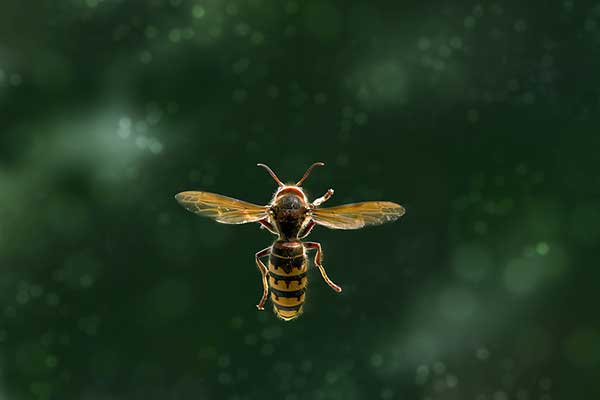With the arrival of wasp season soon, you may begin noticing a rise in wasp activity.
As the queens awaken from their winter slumber, they begin their quest for a perfect spot to establish their new home and raise a family.
They often choose locations like undergrounds, sheds, garages, trees, houses, businesses, or more likely, lofts, and roof spaces.
The Life Cycle and Habits of Wasps
During the early part of the year, wasps usually keep to themselves.
However, as their nest grows, they can become bothersome.
A growing nest means an increase in the number of wasps, especially during warmer, sunny days. On cooler, rainy days, their activities are toned down.
When fully built, a typical nest can house 15-25,000 wasps at its peak.
Wasp nests reach their maximum size around July to August, depending on the weather. Earlier warmth (April or May) speeds up the nest building, whereas cold weather delays it.
What Do Wasps Feed On?
Early in their season, wasps are fond of feasting on garden insects. But as these insects hibernate and food becomes scarce, wasps switch to sweeter meals like rotting fruit or sugary drinks.
This change in diet makes wasps more daring, venturing into human spaces, making nuisances of themselves during barbecues, park visits, or other outdoor activities. Essentially, they are attracted to readily available food sources.
Detecting a Wasp Nest
Here are some do’s and don’ts!
On sunny days, inspect your property for wasps around gutters and roof tiles. Regular wasp activity could indicate a nest.
Watch out for wasps around your garden’s bins, compost heaps, bushes, and trees.
Remember, wasp activity near your tree or bush doesn’t always mean there’s a nest there!
Avoid seeking a nest in your loft or roof space with a torch or light, as wasps are attracted to light. Observing from outside is a safer bet!
The Need for Expert Help
Suspecting a wasp nest on your property? We strongly recommend professional wasp control help.
Turning to social media advice could lead you to dangerous solutions. While burning or spraying the nest may likely work, it could also result in property damage or multiple painful stings.
Dealing with wasps can be risky, as their stings can be potentially fatal.
Even professionals with the right gear get stung occasionally. After 29 years in the business, I can tell you, it still hurts!
Should You Trust “Other Professionals”?
Seeking help from gardeners or window cleaners isn’t advisable unless they are duly qualified and insured. DIY pest control can have disastrous outcomes.
The way we see it, you wouldn’t call a gardener to service your gas boiler, right? You’d need a gas safe engineer to avoid getting blown up or gassed. The same applies to dealing with pesticides and rodenticides. They’re harmful when misused.
Certified pest controllers are qualified for a reason – they have appropriate training and expertise. Taking advice from non-experts on social media can be dangerous.
Don’t risk your family or colleagues’ safety.
Is Wasp Control Costly?
Not always. Smaller independent companies like The Pest Master won’t break your bank.
We, among other professional companies, are willing to offer free pest control advice via phone or email. It’s as quick as drafting a social media post.
In conclusion, if you suspect a wasp issue, feel free to contact us. We’re always happy to provide professional advice.


